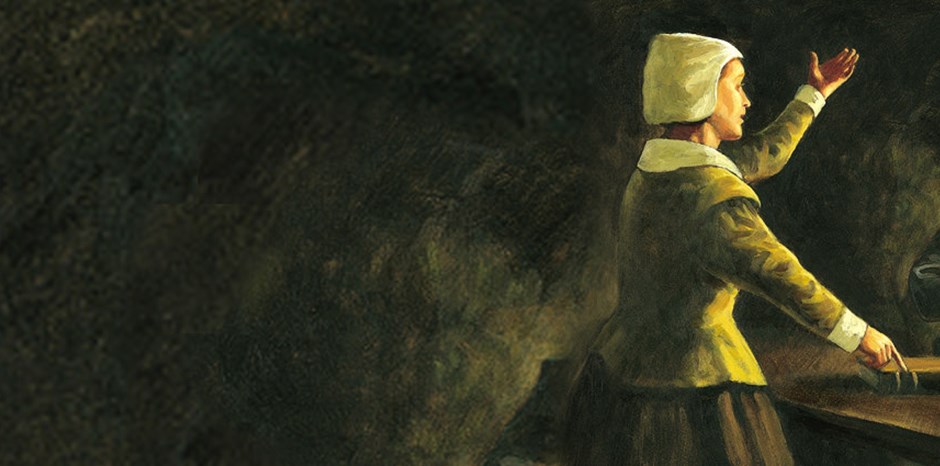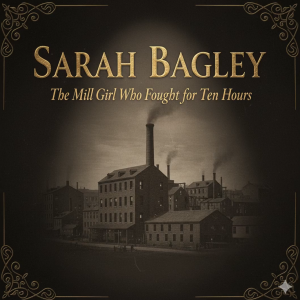For centuries women have fought against numerous injustices forced upon them because of their gender. Some of these injustices include the right to be seen as an equal to men, the right to vote, and the right for equal pay, along with many more. Although women have succeeded in breaking down some of these barriers, there are still many inequalities being fought today. During the seventeenth century, there was one woman in particular who battled in opposition to social injustice: Anne Hutchinson. This article is about the life of a brave woman who opposed an unfair law forbidding men and women from freely practicing their religion, and who also challenged the preposterous roles women were limited to in the religious community.

Anne Hutchinson, maiden name Anne Marbury, was born July 20, 1591, in Alford, England. She was the daughter of a midwife and a Cambridge scholar who published many unorthodox religious texts. In fact, Francis Marbury’s teachings were banned from where he was a teacher, at Saint Wilfred’s School in Alford. After vigorous pleading, Marbury was able to have the ban lifted, and he began teaching again in 1602. 1 Perhaps this is where Anne inherited her tenacious spirit to express her opinion. In 1605, at the young age of fourteen, Anne and her family moved to London for her father’s new position as rector of Saint Martin’s Vintry, leaving behind Anne’s boyfriend, a tailor named William Hutchinson. After the death of Anne’s father in 1611, Hutchinson moved to London to be with Anne; the next year the two were married. That same year, the newlywed bride returned to Alford where her husband continued his tailor business, and Anne followed in her mother’s footsteps as a midwife. Anne and William went on to raise thirteen children together in Alford. 2
In 1612, newly ordained Puritan minister John Cotton began preaching at Saint Botolph’s Church in Boston, Lincolnshire, not far from Alford where Anne Hutchinson resided. His unique approach greatly intrigued Hutchinson. 3 Cotton’s preaching and his understandings of religion reminded Anne of her father’s teachings. Anne enjoyed Cotton’s work so much, that in 1633, when Cotton immigrated to New England, Anne convinced her husband to move there as well. In 1634, Anne and her family made the long transition to Massachusetts. 4
The following year, in 1635, Hutchinson began holding weekly gatherings in her home to discuss minister Cotton’s sermons. Anne and her followers addressed their beliefs of sheer grace as opposed to the Calvinist theological viewpoint of predestination. Hutchinson and her followers believed that God alone grants salvation to whomever He believes is worthy of His grace, without human interaction. The clergy in New England taught that people could gain God’s grace by willingly performing various covenant conditions, such as performing good deeds, reciting prayers, attending church, along with other forms of religious practice. 5 Anne’s critics called her teachings Antinomianism. The Greek word is translated as “hostile to the law.” Anne provoked the colony leaders by proclaiming that members of their clergy who had not undergone a conversion experience had no authority to be held responsible for the spiritual offices of the colony. She also brought attention to the common yet unfair assumptions of women’s roles within Puritan society. 6 Anne’s following continued to grow, and it became so significant that in the 1636 governor’s election, the colony prevented the reelection of the current governor John Winthrop, and elected Sir Henry Vane the Younger into office. Sir Henry was an outspoken supporter of Anne’s movement, and he was a strong supporter of the anti-Winthrop movement.

Anne’s rising popularity caused three major problems for the colonial leaders. First, Anne’s gatherings paralleled preaching, which was strictly limited to those with a licence, and was absolutely forbidden to women. Second, the New England clergy was putting forth great effort in order to establish a unified church. Anne’s teachings contradicted their efforts. Third, Anne’s supporters consisted of both men and women. This act challenged the status quo of men being the only influential figures within society. 7 Never before had a woman caused so much trouble for authority figures, nor had a woman been the leader of a huge support of individuals.
The turning point of Anne’s momentum occurred during the governor election in May 1637, when former governor John Winthrop was reelected to office. It is not difficult to understand why Winthrop put Hutchinson on trial for heresy when he took office in November. 8 Winthrop was desperate to regain social order within the colony. The trial was held publicly to make an example out of Hutchinson, to show what happens to those who oppose the church and therefore oppose the colonial leadership. Anne surprised many with her witty banter and intellectual remarks. She defended herself quite impressively, proving her knowledge of the Bible and religious laws, and also by providing evidence demonstrating that her accused charge was based on more circumstantial evidence than proven facts of illegal activity. For example, the court tried to charge her with sedition, or an action suggesting discontent or rebellious actions against the government. Hutchinson made it clear that expressing opinions and holding conversations within a women’s meeting was not an illegal act. The statements made within those meetings were confidential because they were held in the privacy of her home. The spectacle of a self-educated woman verbally battling a governor who was a Cambridge scholar on an equal level was unheard of. Despite Hutchinson’s efforts, she was still convicted and banished from the colony. Anne was at a disadvantage from the start with civil officers, elected deputies, and clergymen represented as the jury in the trial. 9 After the verdict, Anne, her family, and a few loyal followers migrated to Rhode Island for a short while before settling in the Dutch colony of New Netherlands, which subsequently became New York. In 1643, Anne and her family became victims of an Indian uprising and were killed during the attack.

Anne Hutchinson is seen as one of the first female feminist who fought for religious freedom. Anne’s actions represent a right established to us as Americans in 1791. The first amendment to the Constitution established the freedoms of religion, assembly, speech, press, and petition. Anne’s reasons for refusing to conform to colonial authorities were reasonable and respectable. She was not the only person to fight for individual freedoms; but her courageous start led the way for others to fight against injustices too.
- John R. Holmes, “Anne Hutchinson,” Salem Press Biographical Encyclopedia (January 2016), 1. ↵
- Holmes, “Anne Hutchinson,” 1. ↵
- Francis J. Bremer, “John Cotton,” Salem Press Biographical Encyclopedia (2016), 1. ↵
- Holmes, “Anne Hutchinson,” 1. ↵
- James F. Cooper, Jr., “Anne Hutchinson and the ‘Lay Rebellion’ against the Clergy,” The New England Quarterly, Inc 61, no. 3 (September 1988): 382-383. ↵
- Alan Brinkley, American History, 15th ed., vol. 1: to 1865 (2 Penn Plaza, New York, NY 10121: McGraw Hill Education, 2015), 45. ↵
- Holmes, “Anne Hutchinson,” 1. ↵
- Alan Brinkley, American History, 45. ↵
- Lisa McGunigal, “The Criminal Trial of Anne Hutchinson: Ritual, Religion, and Law,” Mosaic: A Journal for the Interdisciplinary Study of Literature 49, no. 2 (June 2016): 1-8. ↵



133 comments
Alexandra Camarena
I really loved this article! I had never heard of Anne Hutchinson before, so I was very fascinated by everything she accomplished. I found it sad that the fact that she is not more well-known even though she made a large impact in history. I found the way the author wrote the story very nice because they gave a lot of background content and detail. Which allows the reader to better understand her story.
Jackie Velasquez
For not having heard of Anne Hutchinson, this article made me realize how brave she was to stand up about her religious beliefs and preach about them at the time. She stood up for what she believed in at all times and followed where her heart was taking her. As someone who doesn’t stand up at times, this makes me believe that no matter what I believe in and think, it is okay to have my own opinions on things.
Emily Davey
This article was just incredible! I’d always been curious about Hutchinson, and to know more about her makes me respect her even more. I had no idea that it was Hutchinson who’d inspired the rights of religion, assembly, and all the others mentioned. Her wit in the courtroom is fascinating as well. It makes sense she’d be well educated and be able to hold her own against a Cambridge scholar if her father was a professor there, I wonder what the reaction of the courtroom were as she battled the judges. Very glad to have read your article, knowing one of the catalysts for feminism in America. I like your use of images, they show Hutchinson in action and give us a taste of the presence she had when commanding a room. Congratulations on your publication!
Dylan Vargas
I liked the article it gave me the starting information I need and gave us a story about who the article is about. It stayed true to the title and showed us what it was talking about with the beginning and up to the end. I was really surprise about was that she raised 13 children and moved to a completely different place on the fact of following some minister that they worshiped, or should I say more Anne worshipped so it was nice reading about what events happened during this time and gave me look of what different genders and people had to deal with at the time.
Victoria Cantu
Superb article! Learning about Anne Hutchinson and imagining the kind of woman she was is inspiring. I’m grateful that I had the opportunity to learn about her but saddened that she is not talked about much. I can’t imagine the frustration she went through, especially as a woman trying to spread her teachings in these times. I applauded her for her bravery and for standing for what she believed in. Her determination had a domino effect on many other people which then later in history caused one of the biggest impacts in history, the first amendment. The last paragraph speaks about this, which I believe is tremendously important since it was a key factor in the history and colonization of America. Hutchinson was changing the world without even knowing it!
Courtney Mcclellan
The article was really interesting, I never knew that their was a “feminist” so early on. The introduction is really informative and it really helps the reader understand why this women was so revolutionary because she was one of the first women to stand up against being a window dressing.The explanation on how she disproved the theory of hearsay by her explaining herself intelligently is really well written.
Idaly Oropeza
Thank you for elaborately describing who Anne Hutchinson was in such an engaging way to keep not only female readers but also male readers attentive. I personally had no idea who she was but after reading this article it is clear that her and many women in this time period will get along. Not only did she represent herself well in court but she did it with a grace and femininity. It is sad that women are still fighting for our basic rights but it is inspiring knowing women have yet to give up.
Vanessa Fabila-Ramirez
Just reading the first couple of sentences make me angry how women life’s use to be. Even right now we still are not equal to men. She was so brave to start a movement, not everybody would be will to do that. This was a really good article. I love the top picture it brings in the whole article when she’s looking outside.
Laura Poole
I feel like I know Anne Hutchinson after reading this. I feel like we would have been friends had we been in the same time period. I loved getting to know her and learning more in depth about her achievements. It is refreshing to here to heroin story with a female as the protagonist even if she did not win her trial. I credit her to the snowball effect she started in the religious scene.
Kristen Leary
This was a very well-written article! Your writing style was so easy to follow, which is impressive given all the new and fascinating information the article provides. I haven’t heard of Anne Hutchinson before reading this, but nonetheless I feel you have captured the significant role she played in the early days of the American colonies. I really enjoyed reading about this woman and all she accomplished as a woman of her time.